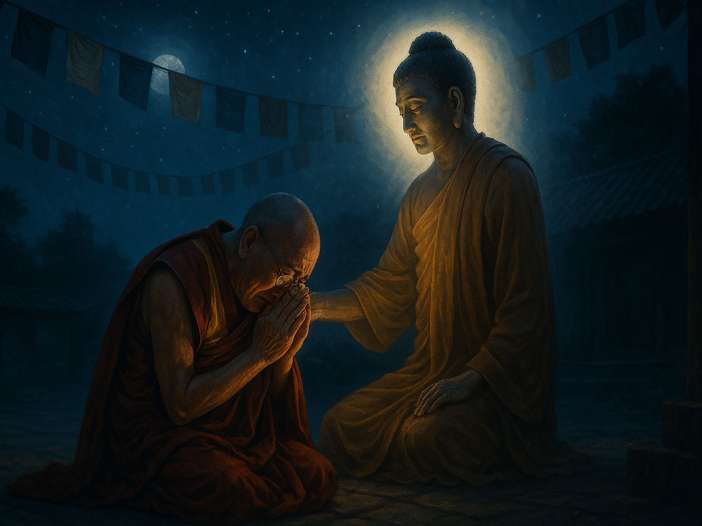
|
Getting your Trinity Audio player ready...
|
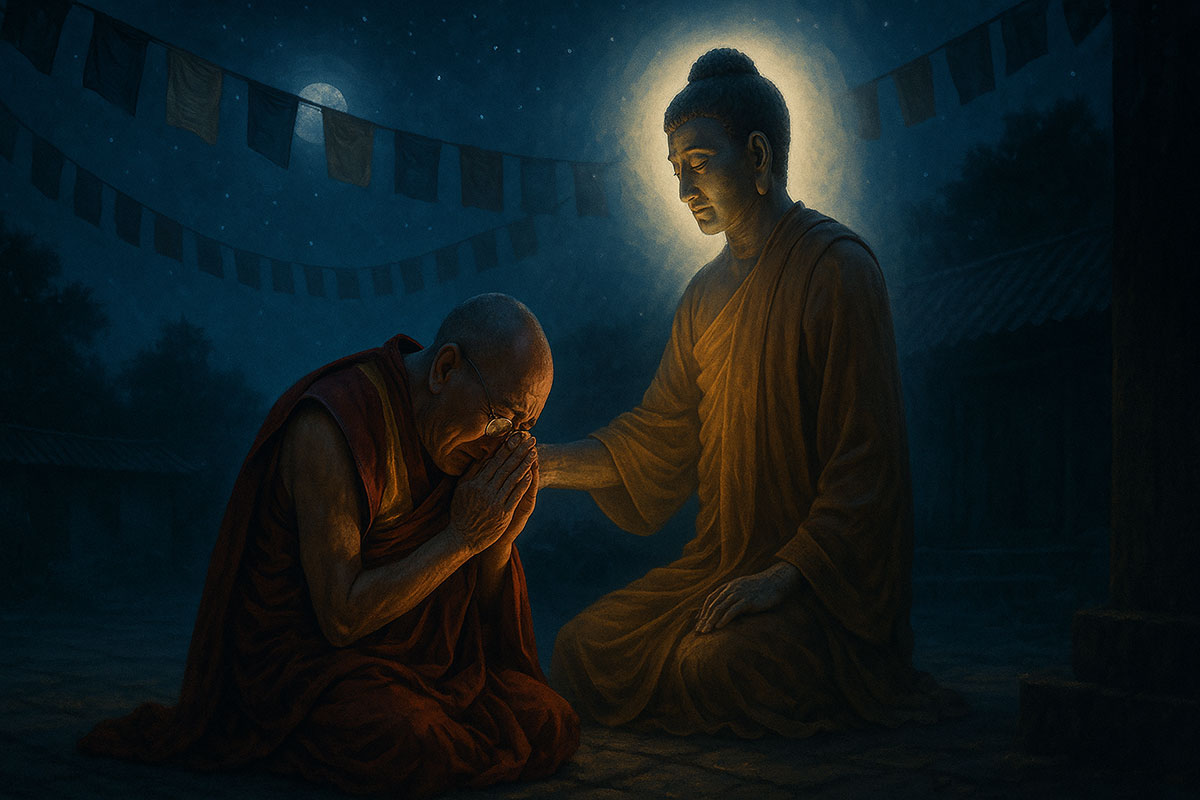
Dalai Lama:
For many years I have tried to live as a servant of compassion. People look at me and see a symbol, but inside I remain simply a human being with questions, doubts, and quiet struggles. When the world suffers, my heart suffers with it. When my people remain without their homeland, I carry that grief inside me.
There are moments when I have wondered if my efforts truly matter. Can one life of teaching and speaking truly ease the pain of millions? Sometimes, I feared that all I could offer were words. And yet, I continued, believing it was my duty to walk the path of compassion no matter the weight.
But there came a moment when the Buddha himself appeared before me. To see him not as memory or statue, but as the living master—this shook me beyond anything I had known. In his presence, I could no longer hide behind discipline or role. I was simply a student again, face to face with the source of the path I had tried to follow.
(Note: This is an imaginary conversation, a creative exploration of an idea, and not a real speech or event.)

Topic 1: The Weight of Compassion — Carrying the World’s Suffering
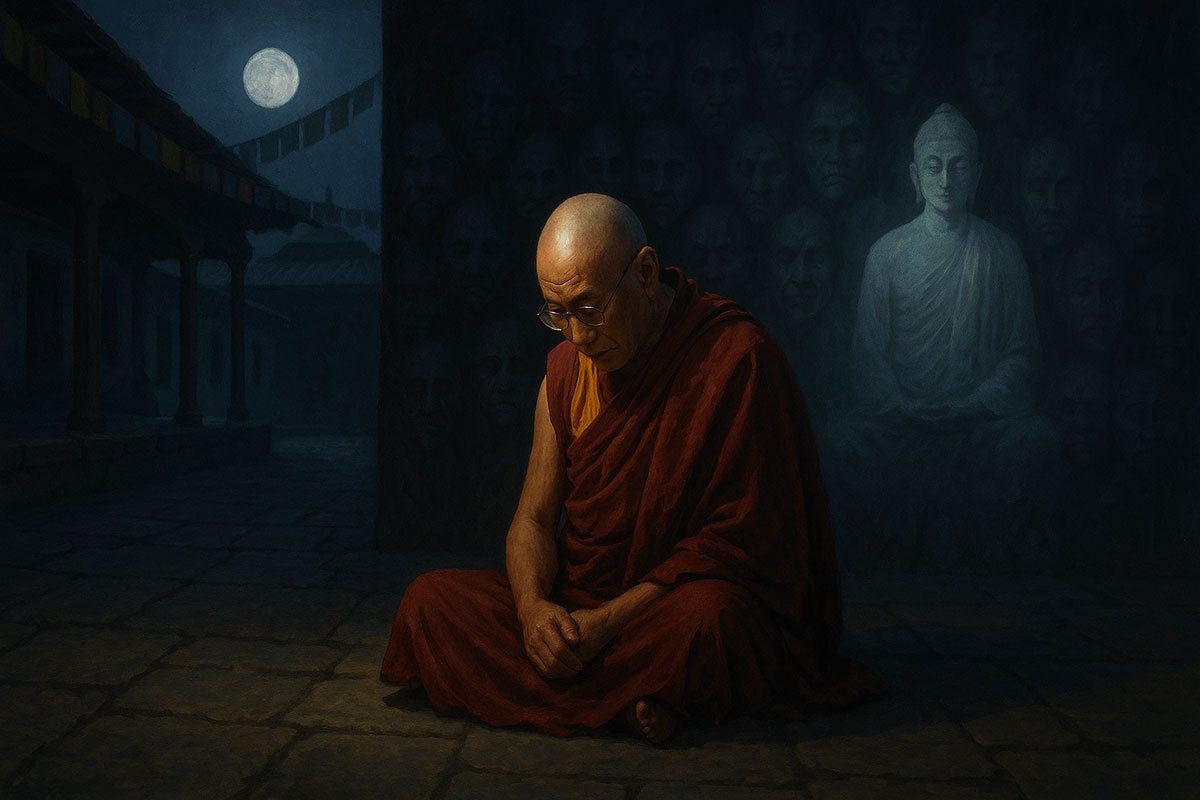
The evening was still. A quiet monastery courtyard lay beneath the moonlight, the prayer flags stirring in the breeze. The Dalai Lama sat in meditation, his back straight, his mind calm yet burdened. For decades he had been the face of Tibetan Buddhism to the world, a symbol of resilience in exile, a teacher of compassion to millions. Yet deep within, he carried the silent grief of displacement, the sorrow of his people, and the weight of always needing to be strong.
As he breathed, a presence stirred. Gentle, luminous, steady as the mountains — Siddhartha Gautama, the Buddha, appeared before him.
The Dalai Lama gasped, his hands trembling. “Master…?”
The Buddha nodded, his eyes alight with compassion. “Tenzin Gyatso, child of the Dharma, you have called me all your life through your devotion. Tonight, I come.”
The Dalai Lama’s throat tightened. He had prayed countless times before the Buddha’s statues, repeated his words, lived in his shadow. But never had he expected this: to see him face to face.
The Buddha spoke softly. “Tell me, why do you carry so much suffering in your heart?”
The Dalai Lama blinked back tears. “Because my people suffer. Because my country suffers. Because the world suffers. I thought if I did not carry it, who would? If I falter, perhaps hope will vanish.”
The Buddha shook his head gently. “Compassion is not the taking of all burdens, Tenzin. It is the seeing of suffering and responding with love — but without losing yourself in the sorrow. You have confused compassion with possession. The suffering of the world is not yours to hold alone.”
The Dalai Lama’s lips trembled. For decades, he had smiled, laughed, spoken words of hope, even as his chest ached with the pain of exile and loss. Now the one he revered told him he had carried it wrongly. His composure cracked, and tears welled.
“I only wanted to honor you,” he whispered. “To embody your teachings.”
The Buddha placed a hand on his shoulder. “And you have. But child, even I could not end all suffering. I only showed the path. You are not asked to be the savior of the world, but a lamp along the way. Let go of what was never yours to hold.”
The Dalai Lama broke. He bent forward, sobs shaking his body, tears spilling freely. For the first time in decades, he allowed himself to collapse, not as the Fourteenth Dalai Lama, not as Tibet’s leader, but as a son before his master.
And the Buddha simply held him.
Topic 2: The True Nature of Compassion — Beyond Teaching, Into Being
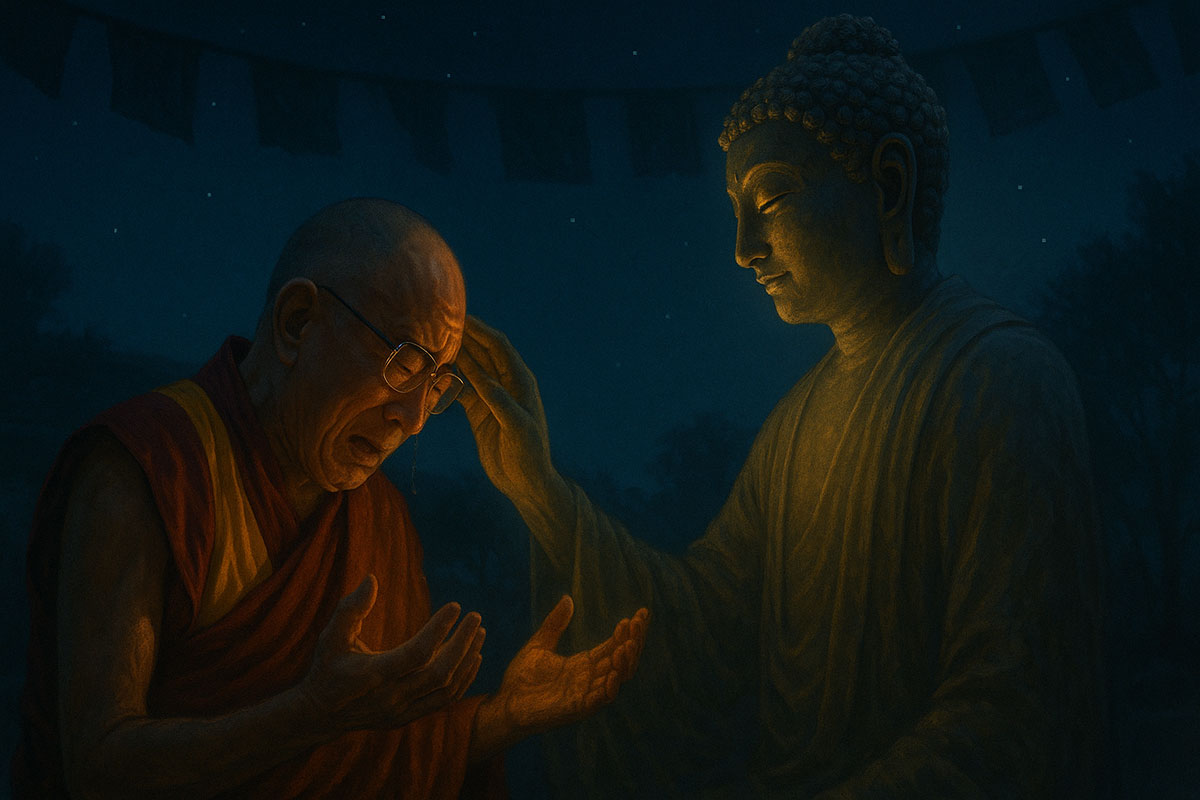
When his sobs subsided, the Dalai Lama lifted his gaze, eyes red, voice hoarse. “Master, I have spoken your teachings my whole life. Compassion, nonviolence, the interdependence of all beings. But sometimes I fear I am only words. Do I truly embody compassion, or am I just a messenger repeating what I do not yet fully know?”
The Buddha smiled softly. “Tenzin, you misunderstand compassion if you measure it by perfection. Compassion is not a mask, nor is it flawless. It is a heart that opens again and again, even after breaking. Tell me — have you loved even when it cost you? Have you forgiven when bitterness beckoned?”
The Dalai Lama’s lips trembled. He thought of the Chinese authorities who had taken his homeland, the endless negotiations, the betrayals, the pain of exile. “I have tried. I have prayed for them, even when my people cursed them. But sometimes, deep down, I still feel anger. Does that mean I have failed compassion?”
The Buddha’s eyes glowed with gentleness. “No. It means you are human. Compassion is not the absence of anger. It is the choice, again and again, to return to love even when anger rises. It is the movement of the heart, not the perfection of it.”
The Dalai Lama’s chest heaved. “Then I am not unworthy of your path?”
The Buddha shook his head. “You are not unworthy. You are my continuation. Compassion flows through you not because you are flawless, but because you are willing. Even in your laughter, even in your tears, even in your doubt — compassion lives.”
At these words, the Dalai Lama’s composure shattered once more. He had carried for so long the fear that he was a poor reflection of the Buddha’s greatness, that history would judge him as inadequate. Now his master himself told him: he was enough. His body shook with sobs, tears running down his face, not of despair but of relief.
The Buddha touched his forehead gently. “You do not need to prove compassion, Tenzin. You are compassion.”
The Dalai Lama wept uncontrollably, unable to contain the release of decades of silent striving.
Topic 3: The Illusion of Self — Meeting the Master Beyond Form
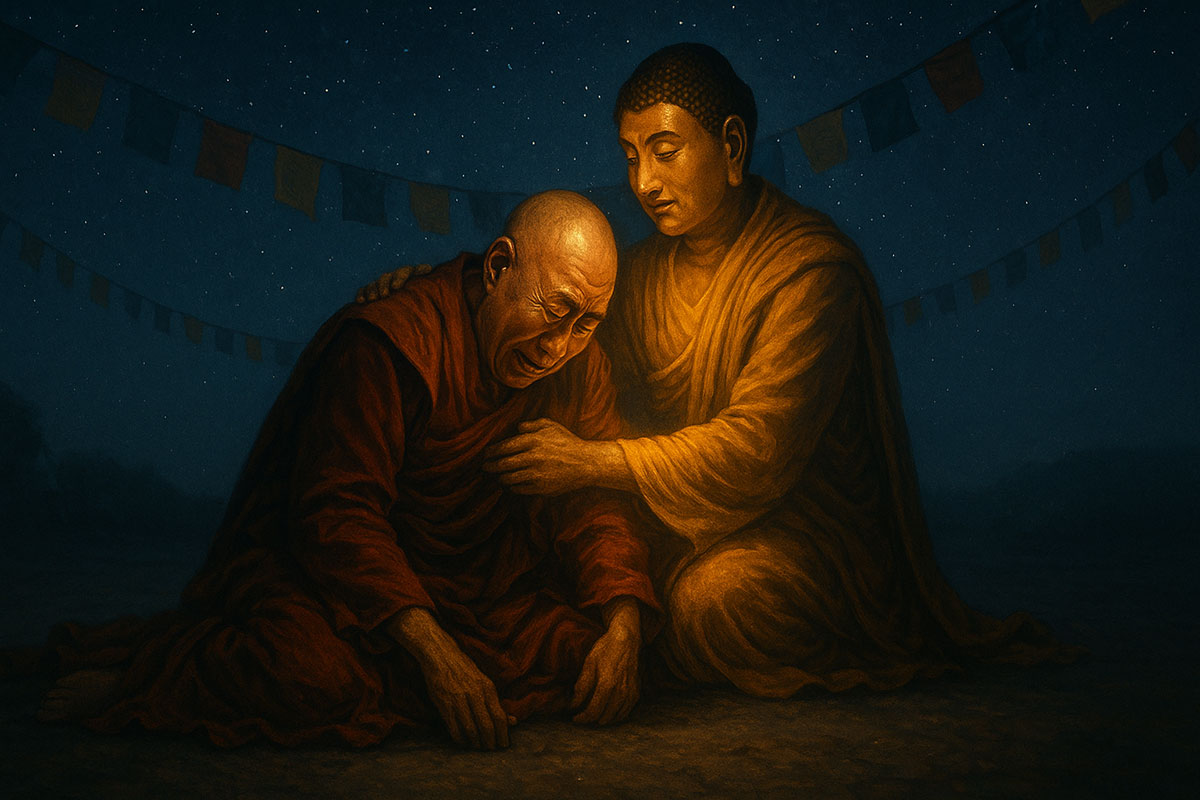
The night deepened, the stars bright above. The Dalai Lama sat close to the Buddha now, his heart raw, his spirit undone.
He whispered, “Master, I have taught that the self is illusion, that clinging is the root of suffering. Yet I have clung to being the Dalai Lama. I have clung to being your servant. Have I failed your teaching by holding to my own identity so tightly?”
The Buddha looked into his eyes, his gaze vast as the sky. “Tenzin, the self is illusion when it imprisons. But the self can also be a vehicle of compassion. You did not cling to being the Dalai Lama out of vanity. You accepted the role so that others might see the Dharma alive in you. That is not bondage. That is service.”
The Dalai Lama’s tears spilled again. “But what if I die and it is not enough? What if my people remain scattered, my homeland never free?”
The Buddha’s voice was deep, steady, like the earth itself. “Then you will have still fulfilled your purpose. The measure of a life is not in outcomes, but in presence. You gave compassion to the world. That is freedom, whether or not Tibet is free.”
The Dalai Lama’s body shook with sobs, more intense than before. He had lived with the secret fear that all his efforts might end in failure. Now the Buddha himself declared it did not matter. His life had already been enough.
The Buddha leaned close, his voice tender. “Do not fear being forgotten, child. Compassion cannot be erased. You are not the Fourteenth Dalai Lama. You are not even Tenzin Gyatso. You are the echo of awakening, as I was. And one day, others will carry it forward. This is the wheel. You are part of it, not the whole.”
The Dalai Lama collapsed, tears pouring down his face, sobbing uncontrollably like a child. His robes, his titles, his composure — all dissolved. What remained was only a heart laid bare before his master, trembling in love and release.
And the Buddha embraced him, not as a leader, not as a teacher, but as a son returned home.
That night, the Dalai Lama met the one whose name he had spoken every day of his life. And in that meeting, the burdens he had carried for decades crumbled. The suffering of his people, the fear of failure, the doubt of worthiness — all dissolved in the compassion of the Buddha.
And when the Buddha whispered that he was enough, the Dalai Lama wept as he had never wept before — not out of despair, but out of the shattering relief of finally being seen, embraced, and freed.
For the world, he was the Fourteenth Dalai Lama. But in that night, he was simply Tenzin, a child in his master’s arms.
Closing Reflection by Dalai Lama

In that encounter, I was undone. The Buddha did not give me more teachings to memorize, nor did he demand that I prove myself worthy. He reminded me that compassion is not something to achieve, but something to remember—that it already flows through us when we open our hearts.
For the first time, I allowed myself to break. I wept with a freedom I had never known, because I realized I did not have to carry everything alone. My worth was not measured by the fate of my country or the success of my words, but by the willingness of my heart to love.
What I received that night was release. Release from the burden of being more than I am. Release from the fear of not being enough. In the arms of the Buddha, I rediscovered the truth that even in imperfection, compassion lives. And that is enough.
Short Bios:
The Dalai Lama
The 14th Dalai Lama, Tenzin Gyatso, is the spiritual leader of Tibetan Buddhism and a global voice for peace, compassion, and nonviolence. Born in 1935, he was recognized as the reincarnation of his predecessor at a young age and later forced into exile when Tibet was occupied. Despite hardship, he has dedicated his life to preserving Tibetan culture, teaching compassion across all faiths, and advocating for harmony among nations and peoples.
The Buddha (Siddhartha Gautama)
Siddhartha Gautama, known as the Buddha, was a spiritual teacher who lived in India over 2,500 years ago. After years of seeking truth, he attained enlightenment beneath the Bodhi tree and spent the rest of his life teaching the path to liberation from suffering. His teachings on mindfulness, compassion, and the middle way continue to guide millions worldwide, shaping one of the most enduring spiritual traditions in history.

Leave a Reply